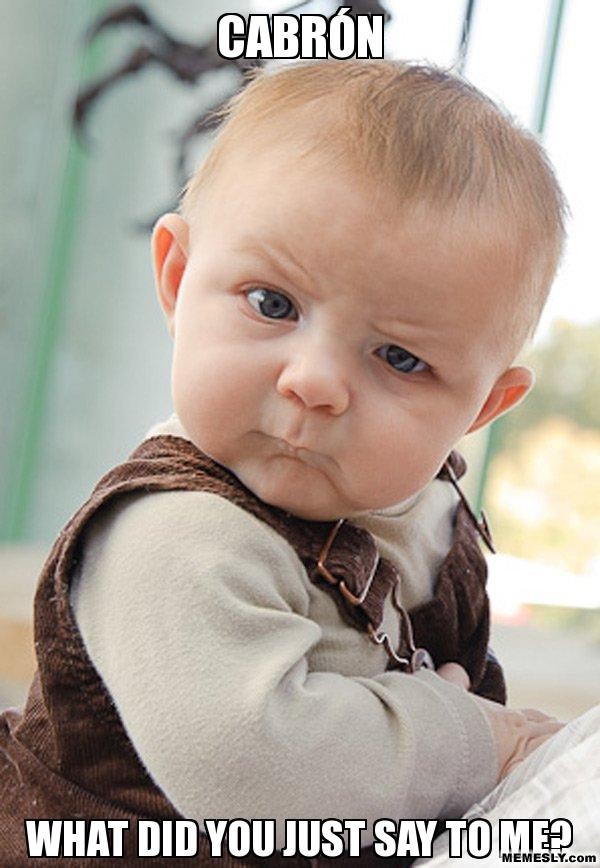Swearing in a foreign language is the first step to fluency...
It really is!
A recent pre-work tapas saw one of the many interesting conversations revolve around swear words and what you can or cannot say. This got me thinking. One thing I do when I speak English is swear. A lot.

As I’m 21 my mother can’t tell me off anymore or threaten to wash my mouth out, nevertheless my potty mouth is something that drives her mad.
However, whenever I speak Spanish or Portuguese, I never swear. Not because I don’t want to, far from it. There have been many occasions where I’ve wanted to swear, so much, only for a long pause to ensue. And after what feels like hours of racking my brains for any profanities I may have learnt from the Spanish dictionary in year 8, the final result is often completely underwhelming, leaving me incapable of communicating how I really feel about something.
DISCLAIMER: I take no responsibility for any fights/confrontations you may get yourself into after reading this article.
Swearing is obviously not something to be proud of, or taught to young children etc. But, in reality it is a huge part of language, especially spoken word. As I said, I myself swear a lot, probably more than I should, but it is how I speak in a colloquial setting, among friends and family. I know how to use it and many different words and phrases to that end. Despite the apparent vulgarity of swearing, it is a language I am most fluent in speaking.

The point I’m trying to make is this: if you can comfortably swear in a language it shows you have a deeper understanding of it. The dos and don’ts, when you can say things and when you can’t, manipulating the same word to mean different things depending on how you say it. Swearing efficiently requires all of these skills, lessons too that aren’t so easily learnt.
Tread carefully
Swearing is offensive by nature, so getting it wrong isn’t easily forgiven. Using the wrong word at the wrong time can land you in serious trouble. For example, calling any random person the equivalent of a ‘dickhead’ is not best advised.
You might be able to get away with it in your native tongue, in English it’s often more a term of endearment than an offensive one. Yet, walking up to anyone in your new country and calling them a dickhead is obviously not a good idea. You need to learn the norms, the rules, the scenarios when swearing is acceptable and how well, or little, you need to know someone before you can start cursing them left right and centre.

I call my little sister a knobhead all the time. That doesn’t mean I can learn the Spanish equivalent, gillipollas, and call my new boss the same thing in my first week. I don’t think I’d still be working here if I did that.
It's a fine line
A Spanish example is the use of puta madre and how one little word before could turn any pleasant situation sour in the blink of an eye.
‘Es la/de puta madre’ translates roughly to ‘the shit’. For example, you might go out for some tapas and love the octopus. If this is the case, you could say ‘este pulpo es de puta madre’ and everything would be fine. You might get a couple of laughs, perhaps even some compliments given your impressive command of foreign profanities, but most importantly you won’t make any enemies.

The same can’t be said however if someone were to ask you what you thought of a work colleague or classmate and you replied ‘puta madre. ’ Omit the ‘de’ at your peril! Not including it is the difference between saying someone is really cool and saying they’re ‘a mother f**cker. ’ The difference between making friends and getting punched straight in the face. It seems strange how a mere two letter word can change the meaning of a phrase so drastically, but it does, and you have to be so careful when using it.
Add these to your vocab list
In general, Spanish is perhaps more forgiving in terms of day-to-day use of swear words, but this doesn’t mean you can throw them about willy-nilly and not expect to piss some people off. If you can learn how to use them, when certain swearwords are acceptable, and when they aren't, then you’ll have learnt a lot about the language. Semantics, phonetics and tone of voice are just as important in speaking a language as the words themselves.
To help practice your mastery of ‘palabrotas’ I’ll give you 5 of the most common swearwords in Spanish and explain a bit about how to use them. I’ve already given you the puta madre situation, so without further ado here’s five more to add to your list of naughty words.
-
Joder
Anyone that is learning Spanish will already know this one. It’s part and parcel of Spanish language and although it’s English equivalent is fuck, the Spanish version is far less offensive. Usually used for emphasis, just like in English, you can throw in a joder pretty much anywhere you like.
¡Joder, cómo llueve! - Fuck me, it’s pissing it down! (Hell, it’s peeing down)

I nicked this example from an old BBC learning languages page and their translation (in brackets) was obviously far less vulgar. Nevertheless, the fact they had a swear word section not only shows how much more common swearing is in Spanish but also how important understanding swear words and profanity in general is to learning a language. I’m not just using it as an excuse to swear myself.
-
Coño
Again another commonly used word, and like joder before, the English equivalent is far more offensive. It literally means the female private parts (lol private parts) and by process of elimination you can probably guess it’s grotesque English translation… c**t for those still wondering.
¡Coño, qué hambre tengo! - Fuck, I’m starving! (Blimey, I’m hungry)

Unlike the English word however, this again can be used for emphasis and throwing the odd ‘coño’ in front of your sentence won’t land you in too much trouble. If anything, as I put in my translation, despite it’s literal translation, its figurative use is closer to fuck, giving you that much needed synonym that teachers are always banging on about.
-
Cojones
You’ve probably heard this one before too, but nevertheless, it’s worthy of it’s mention. Literally translating as ‘testicles’ its used in the same way the ‘bollocks’ is used in English. Both are often used upon hearing a friend weave an elaborate lie and rather than responding in a polite manner, you can dismiss their bold claims with one simple word.
“Fui a la playa en Madrid y conocí a Cristiano Ronaldo. ” - “I went to a beach in Madrid and met Cristiano Ronaldo. ”
“¡Cojones! ” - “Bollocks! ”

Bullshit is another good translation but given that bollocks means testicles as well, I thought it would be the more complete translation.
-
Cabrón
You can use this word to mean ‘tío’ or mate as we would say in English (bro if you’re one of those people). However, the word that literally translates to ‘male goat’ can also be used as an insult. Here we find one of those cases when how and when you say a word makes a massive difference to what it means.
¡Qué cabrón! - Bastard!

Cabrón is a bit like the English knob head I mentioned earlier. It’s more a term on endearment used among friends and often sarcastic in nature. But just remember, this doesn’t mean you can call everyone you meet a male goat, someone will eventually take offence.
-
Me cago en…
Three words that have endless possibilities. Literally translating as ‘I shit in…’, the Spanish have made this rather vivid imagery quite famous and this swear word/phrase is one of the most pliable profanties around. Due to it’s many forms, I’ll give you more than just one way you can fling around your shit.
Me cago en todo lo que se menea - I shit in everything that moves
Expression of anger and frustration. Perfect to let off steam when stuck in traffics jams or assembling IKEA furniture etc.

Me cago en tus muertos - I shit on your dead relatives
To us it seems pretty deep, but in Spanish it's not as bad as you think. I would still be careful when using it, I can imagine some people won’t take too kindly to your figurative defecating on their loved ones’ graves.
Me cago en la leche - I shit in the milk
Again, despite the variation it’s used in the same way. A release of frustration and anger that is necessary should you stub your toe or burn yourself cooking.
Me cago en la puta - I shit in the whore
Literally translated it’s even more confusing than the others. Despite suggesting some sort of faeces related fetish it is simply the more extreme version of the milk variant. Use it when you are really angry and you stub your toe… twice.

Depending on what you shit in, the phrase translates figuratively from something as timid as a ‘damn’ all the way to a full blown ‘FOR FUCK SAKE’
Mastering this phrase, let alone swearing in general, is a feat in itself.
First step to fluency
As I said, working out when and where you can use these words and phrases is an important part of learning a language. Don’t start throwing them around in your next oral exam…
Learning about swear words and their place in a language, their prominence for example in this case, helps you understand the culture and therefore the language itself.
Don’t be afraid to swear, you’ll learn more by doing so. Just be really careful…
Not everyone takes kindly to being shat on.
Photo gallery
Content available in other languages
- Français: Jurer dans une langue étrangère est la première étape vers la fluidité
- Polski: Przeklinanie w obcym języku pierwszym krokiem do płynnego porozumiewania się
- Español: Decir palabrotas en otro idioma es el primer paso hacia la fluidez...
- Italiano: Imprecare in una lingua straniera è il primo passo verso la scioltezza...
- Türkçe: Bir dilde küfür etmek o dilde akıcı olmanın ilk adımıdır...
- Deutsch: Fluchen in einer fremden Sprache ist der erste Schritt für das fliesende Sprechen...
- Português: Dizer palavrões numa língua estrangeira é o primeiro passo para a fluência...
- Nederlands: Schelden in een vreemde taal is de eerste stap tot het vloeiend spreken...
Want to have your own Erasmus blog?
If you are experiencing living abroad, you're an avid traveller or want to promote the city where you live... create your own blog and share your adventures!
I want to create my Erasmus blog! →













Comments (2 comments)
I believe that the first thing people should learn are the swear words. Why? If you accidentally push someone then there is a bigger chance to hear swear words than "excuse me sir, you've pushed me and I didn't like it". The same goes for the driving around the foreign country. Almost all of the thing you'll hear will be something like: "watch where you are going, you wanker/tosser". After that you should focus on more complicated phrases like: "I was stabbed, where's the nearest clinic", "Please, don't arrest me, those are recreational drugs" or "It wasn't me, he died all by himself" ;)
If you know swear words, then you'll know that you are being sweared at and could act accordingly. One "tut mir leid" or "Excusez-moi" and you'll defuse the ticking bomb.
Awesome entry! As a Spanish speaker I really enjoyed your thoughts! However, there are some uses that aren't really correct. Just like anywhere else, in Spain cuss words are really nuanced. F.e: Es de puta madre sounds really weird. The correct way would be to use the verb 'estar' (In Spanish we have two verbs that mean 'to be' but we use them differently). Está de puta madre. You can as well omit 'está de', saying just 'puta madre' and it still means the same. It's only insulting when you add 'tu' (your) to the sentence (tu puta madre), because it directly involves the hearer's mother. Also, 'cojones' is not used as 'bollocks' in English. It translates as 'bollocks' but it's used as an expression of surprise. If you add 'los'(the, plural), however, then it acquires this new meaning of 'bullshit'. Something like: '- ¡Cojones!' (Surprise). '-¡Los cojones!'(Bullshit!).